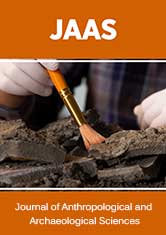
Lupine Publishers Group
Lupine Publishers
Menu
ISSN: 2690-5752
Mini Review(ISSN: 2690-5752) 
LEAP Science and Maths School– An Anthropologically- Grounded Education Intervention Model During COVID-19 Volume 3 - Issue 1
John Gilmour1 and AnitraThorhaug2*
- 1Founder, Leap Science and Maths Schools, South Africa
- 2Yale University and President Greater Caribbean Energy & Environment Foundation, USA
Received: November 15, 2020 Published: December 08, 2020
Corresponding author: Anitra Thorhaug, Yale University, and President Greater Caribbean Energy & Environment Foundation, USA
DOI: 10.32474/JAAS.2020.03.000155
Abstract
During COVID-19 the learning experience for students entirely from the lowest quintile of the South African Black population proved highly difficult after the South African government closed all schools in March,2020, especially for secondary schools. A remarkable values-driven culturally coherent Leap Schools of Science and Maths with six campuses utilized cell phones to continue teaching and engaging the students. The necessity was due to the inability of families of students to provide other internet connections. The new methodology of learning of Leap Schools includes the skill of teachers in consciousness-raising and the extraordinary resilience of the students. Students were grounded by LEAP methodology in both anthropologically designed activities and consciousness-raising and showed self-determination at a mature level surpassing the public school students as assessed by the Department of Education of South Africa.
Introduction
LEAP Science and Maths Schools have developed a valuesdriven
culturally coherent school model as a successful approach
to break the cycle of poverty for Black children living in the
lowest economic category in South African township and rural
communities. South Africa presently has the highest GINI coefficient
showing the largest global difference between rich and poor. The
model on which the Schools were founded by John Gilmour has for
seventeen years worked to create schools where high expectations,
self-liberating pedagogy, and a powerful sense of belonging to
school and community, have reduced the huge drop-out problem
and ensured access to pathways into economic productivity and
responsible citizenship [1].
LEAP adopts a unique Life Orientation based approach to
social-emotional learning leading to self-liberating consciousness
development and life success. The model builds on the basic
construct of circles of healing in which all LEAP students participate
on a daily basis in difficult conversations unlocking personal insight
and understanding opening the door to self-liberation and meta
cognitive capacity for critical thinking. The success of the model
is reflected in Table 1 in a number of areas of measurement and
assessment including the following: academic results; measures of
resilience and academic literacy; and post-school outcomes seen in.
Table 1. Comparison LEAP to Public Schools in national South African testsplus access to Universities and Pass rates.
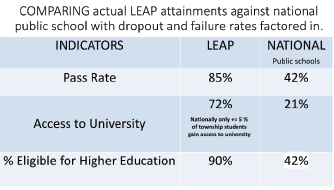
The real value of Life Orientation is “process intervention”
relying on daily time spent in the facilitated process circle groups, results in accelerated learning in the subject areas of Maths and
Science, subjects from which black children in South Africa were
barred prior to 1994. This approach applies conscious focus on
personal emotional development and liberating school structures
intended to ensure appropriate cultural coherence has ensured the
development of an African school model that tends to the child’s
well-being through identity construction and development of
intrinsic capacity for self-regulation.
The LEAP model assumes that moral courage derived from
an education for cultural coherence is extremely likely to lead
to personal agency and some degree of critical distance from
students inherited beliefs by virtue of the inescapable differences
encountered in the larger society. This daily encounter particularly
with secular, materialistic difference is very likely to encourage
critical reflection on ideas and convictions, certainly to a higher
degree than is likely to be the case for many cosmopolitan people for
whom principled encounters with difference are often incoherent
or irrelevant. Perhaps most importantly, an education for cultural
coherence may very well provide persons with a vantage point
from which to critique a culture of mass conformity, consumerism
and materialism; it also may provide each student with amoral
foundation from which strength can be drawn in encountering
social injustice.
LEAP embraces the ancient African philosophy of Ubuntu as
an African alternative basis for quality education to the rugged
individualism often projected as the mark of potential progress
as discussed by Prof. John Volmick (Figure 1).” Ubuntu has the
potential to influence all spheres of people development and of
governance”.
Results
Application of African Active Leaning and consciousness training to Pandemic constraints with positive outcomes for Science and Math learning (Figure 1 and 2).
Figure 1: Concept of Ubuntu by various Educational authorities in South Africa. AT right, Prof. Joh Volmink, University of South Africa and Ubuntu.

Figure 2: Photos of Action based- Leap learning regenerating endemic Spekboom native habitat plant prior to European colonization decimation including with livestock. Spekboom provides Carbon sequestration for Climate change, Biodiversity habitat, soil enrichment, water retention services to citizens. LEAP students in action-based learning projects planting endemic, carbon-sequestering Spekboom – children in regenerative projects as change agents.
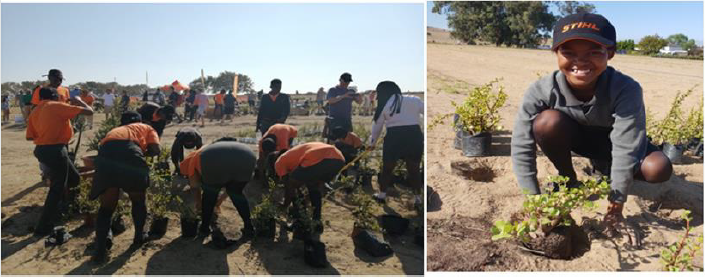
Digital Integration in LEAP Schools in 2020
While the bulk of the Western world and privileged schools in South Africa are able to switch to online teaching and learning platforms, most South African schools are in no position to do this given that they are working with children who generally do not have access to suitable devices or connectivity. The reality is that in times of disasters of the nature of Coronavirus, communities served by the LEAP Science and Maths Schools, have been at risk of suffering the consequences most severely. It remains a great challenge within the Sustainable Development Goal framework that the Corona virus pandemic could further widen the digital gap and increase poverty. All LEAP students come into the school having had limited access to the internet and generally only access via cell-phones. LEAP does not provide or facilitate the acquisition of devices for the children. This is directly parallel to the children in state public schools. However, when the lockdown commenced, LEAP activated access to cell-phones through communication with families to encourage the sharing of family phones for online communication and learning and the provision of phones for many students where there has been no family access and ensured that these students are able to be connected.
Results of Cell Phone Support
The results showed very high levels of student engagement throughout lockdown; social emotional support from teachers continued unabated; peer connection and peer learning groups continued and grew; and academic work continued. The Table 2 shows IXL skill progress summary: (Figure 3 and 4, Table 3)
Figure 3:LEAP Schools record of disciplinary fields of employment into which former students became engaged after 4 years of LEAP education. Products indicating important social outcomes of LEAP education are listed at left of table.
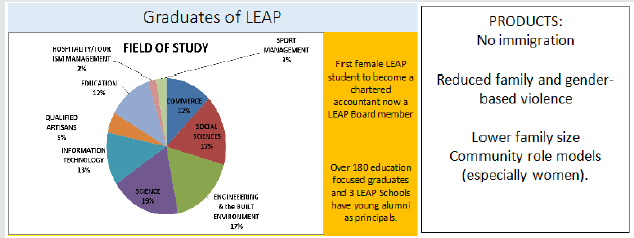
Figure 4: Women form 66% of Leap students and graduates. Photos of recent Graduates, in Maths and in Science and cultural expression activities of music and dance along withCommunity child-care activities of LEAP.
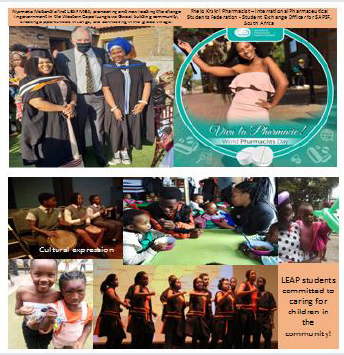
Table 2: L Skill Progress of LEAP students during cellphone learning of COVID-19 full lockdown, and partial lockdown period (12th grade in classrooms, with others by distance learning).(March 2020 through November 2020.)

Table 3: The general charactertics of enhancement byLEAP education. And Prediction of intervention in school System of LEAP via its Leap Institute for Teacher training.
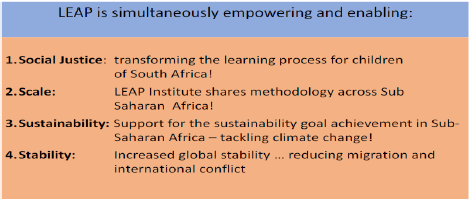
Conclusion
The success of the LEAP Science and Maths Schools in South Africa is directly attributable to ensuring cultural coherence and exploring and affirming historical cultural context for all students. During COVID-19 lockdown the students were able to respond creatively using their family cell phones. This was a direct result of real learning purpose, and their intrinsically driven consciousness, as a consequence of the development of a strong sense of self and the internalised values of the African principles of UBUNTU cultivated through the LEAP pedagogy of self-liberation.
References
- Clarke JH (1992) Africans at the Crossroads: African World Revolution.

Top Editors
-

Mark E Smith
Bio chemistry
University of Texas Medical Branch, USA -

Lawrence A Presley
Department of Criminal Justice
Liberty University, USA -

Thomas W Miller
Department of Psychiatry
University of Kentucky, USA -

Gjumrakch Aliev
Department of Medicine
Gally International Biomedical Research & Consulting LLC, USA -

Christopher Bryant
Department of Urbanisation and Agricultural
Montreal university, USA -

Robert William Frare
Oral & Maxillofacial Pathology
New York University, USA -

Rudolph Modesto Navari
Gastroenterology and Hepatology
University of Alabama, UK -

Andrew Hague
Department of Medicine
Universities of Bradford, UK -

George Gregory Buttigieg
Maltese College of Obstetrics and Gynaecology, Europe -

Chen-Hsiung Yeh
Oncology
Circulogene Theranostics, England -
.png)
Emilio Bucio-Carrillo
Radiation Chemistry
National University of Mexico, USA -
.jpg)
Casey J Grenier
Analytical Chemistry
Wentworth Institute of Technology, USA -
Hany Atalah
Minimally Invasive Surgery
Mercer University school of Medicine, USA -

Abu-Hussein Muhamad
Pediatric Dentistry
University of Athens , Greece

The annual scholar awards from Lupine Publishers honor a selected number Read More...




